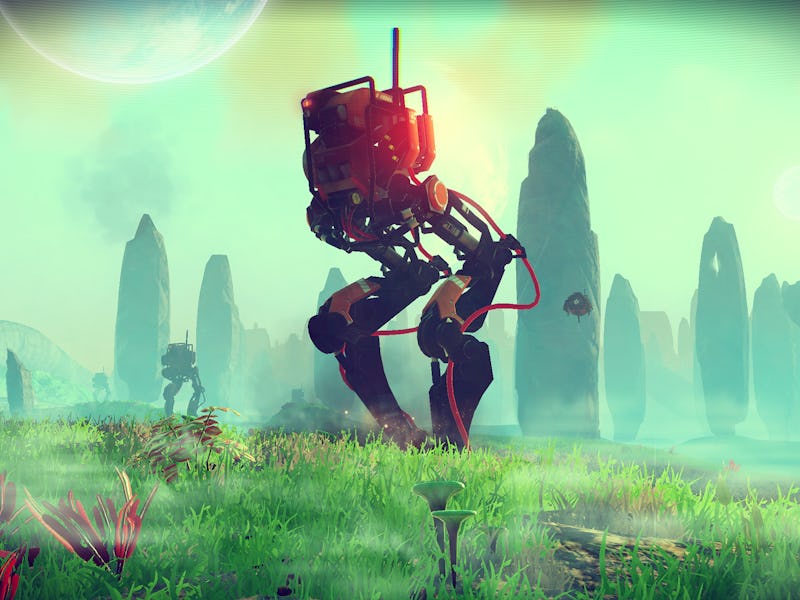The Sentinels of 'No Man's Sky' Are Sinister, Pass it On
Just who are these mysterious, annoying little drones?

The sentinels of No Man’s Sky are certainly one of the most present elements within the game, focused solely on the protection of the universe around them. These self-replicating mechanical beings are essentially the unspoken police, whom force players are constantly under the supervision of – and, despite the work of the community at large, still remain mostly a mystery.
Like other forms of mechanical life in science fiction, the sentinels appear to share a consciousness similar to what we might expect from the Geth of Mass Effect or the Replicators from Stargate SG-1. Although we don’t exactly know how vast this consciousness is, we do know that it is directly connected to the Atlas, the massive data recovery and storage system that catalogs all of the discoveries we find as a player.
So, if the sentinels are directly connected to the Atlas, we’re basically feeding them continuous data as a player, further allowing them (and the Atlas) to identify, defend, and control more of the universe. But this could also play into a much larger picture.
So far, players have yet to discover any planets or system with advanced civilization present despite efforts to explore each respective galaxy. Most of the life found in No Man’s Sky is currently centered on smaller outposts, trading centers, and space stations — each owned by one of the three sentient species present in the game. But you can’t help but wonder why they’ve only limited themselves to these smaller structures instead of building up civilizations themselves. It could very well be because the sentinels shut them down each time they tried.
Based on player interactions with the sentinels, we know that the protection of rare resources and intelligent life is the only goal of the sentinel consciousness, both of which would be severely harmed if one of the sentient species of No Man’s Sky worked to colonize an entire planet. Not only would colonization upset the balance of an ecosystem on a massive scale, but it would require a lot of resources present on said planet as well — which would encourage the sentinels to come in full force to annihilate those trying to build a colony with extreme prejudice.
This type of interaction would also help explain why the Korvak, Gek, and Vy’Keen have remained largely in space and on smaller outposts scattered throughout the galaxy.
According to the scattered history of the Vy’Keen, they seem to have the most direct hatred of the sentinels and the Atlas. Focused on war, freedom, and honor, the Vy’Keen don’t respect the power that the sentinels have over them because it doesn’t allow them to follow cultural traditions. What’s more interesting though is how many of the Vy’Keen monoliths and plaques directly explore this oppressive nature, namely by referencing Hirk.
Hirk appears to be one of the central deities or gods behind Vy’Keen society, but also one who directly interacted with the sentinels and Atlas in the past through some form of communication. In many of his teachings found via plaques and monoliths, Hirk speaks of their hatred towards the sentinels and how their ultimate demise will benefit the exploration and overall galaxy life. During his travels, Hirk appears to have found a “Great Monolith” with which he conversed.
“It came to pass that the Great Monolith awoke. It heard the challenge of Hirk. Five times Hirk called upon it and was met by silence. On the sixth cry it awoke.” – Vy’Keen Plaque
Upon awaking the Great Monolith however, Hirk was awarded with this response:
“‘There should be no need of blood for our meeting, we are but a dream in an infinite universe.’ But, when Hirk responded with, ‘But what of these sentinels?’ the monolith spoke no more, the silence making the ruling of the Atlas over the galaxy all the more apparent.”
It’s entirely possible that Hirk could have been one of the most successful and established people of the Vy’Keen. Much like the player, Hirk set out to discover more of the universe while exemplifying the values of Vy’Keen culture, but when he finally met the Atlas through the Great Monolith, took a different approach to dealing with it compared to us as players.
The Vy’Keen interpretation of the sentinels and the Atlas doesn’t inherently make them evil however, namely because they would also be preventing a race such as the Gek from dominating the universe by instilling these limitations on larger, more complex civilizations. While they may seem like peaceful traders now, many of the Gek monoliths refer to them as evil overlords who wish to bring the death of many. Something that the sentinels and the Atlas obviously helped prevent by limiting their existence to that of the traders they are in-game today.
One thing’s for sure: We know that the sentinels and the Atlas are here to stay, remaining an ever-present element of No Mans Sky. The bigger question however, is whether or not we can influence or destroy them as players. Many of the game’s races, specifically the Vy’Keen, seem to be excited upon encountering us and eager to aid us on our journey. It could be due to their culture, sure, but it could also be because we are one of the few, like Hirk, who have the potential to bring down the sentinels for good and end the rule of the Atlas. An alien race can dream, right?